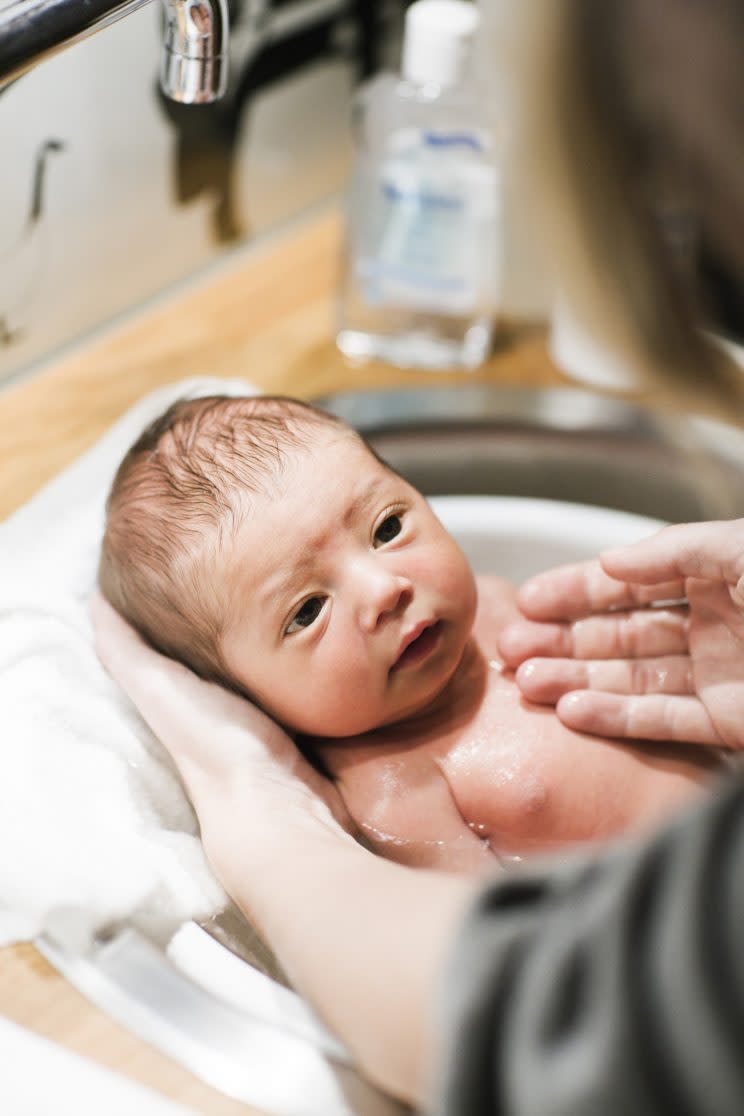Newborn 'Wait to Bathe' Policy Takes Off

Another U.S. city is signing on for what’s shaping up to be the next big movement in natural birthing: delaying a newborn’s first bath, to promote infant health, breastfeeding, and mother-baby bonding.
“You figure it was there for a reason, but I never knew it was so amazing for the baby,” nurse and researcher Courtney Buss told the Chicago Tribune about the white, waxy substance, called vernix, that coats a newborn’s skin and is often washed off too hastily.
Now Buss’s Advocate Sherman Hospital in Elgin, along with five other hospitals out of Chicago’s Advocate hospital system, are adopting a “wait to bathe” policy, spurred on by Buss’s research on outcomes as part of a fellowship for studying best practices.
“All of our Advocate Health Care hospitals are in various stages of implementing this policy/process,” a hospital spokesperson tells Yahoo Beauty. “I believe seven are doing it and the other three will be on-boarded by this summer and fall.”
Among Buss’s powerful findings: The percentage of babies with hypothermia decreased from 29 percent to 14 percent after baths were delayed (rather than given immediately, because of a misperception that newborns are “dirty”). Hypoglycemia rates, she added, dropped from 21 percent to 7 percent in the first month, while breastfeeding rates increased from 51 percent to 71 percent, as vernix helps an infant pick up its mother’s scent.
Nine months later, the evidence was even stronger, Buss told the newspaper, as hypothermia rates had dropped to 7 percent and hypoglycemia had rates dropped to 4 percent, while breastfeeding rates increased to 78 percent.
Vernix also contains antimicrobial proteins that are active against group B strep, E. coli and other common perinatal risks.
“You can’t argue with these results,” Fran Tefi-Teal, director of the Birth Center at the hospital told the Tribune.
The Elgin location is also an accredited Baby-Friendly USA hospital — one of 440 hospitals that adhere to specific evidence-based practices that aim for improved health outcomes and higher breastfeeding rates. One of the guidelines is to help new moms initiate breastfeeding within an hour of birth, and to that end, the guidelines for evaluation include the following: “Procedures requiring separation of the mother and infant (bathing, for example) should be delayed until after this initial period of skin-to-skin contact and should be conducted, whenever feasible, at the mother’s bedside. Additionally, skin-to-skin contact should be encouraged throughout the hospital stay.”
The idea of delaying bathing is not new, and one that’s recommended as a standard of care by the World Health Organization, which advises, “Bathing should be delayed until after 24 hours of birth. If this is not possible due to cultural reasons, bathing should be delayed for at least six hours. Appropriate clothing of the baby for ambient temperature is recommended. This means one to two layers of clothes more than adults, and use of hats/caps. The mother and baby should not be separated and should stay in the same room 24 hours a day.”
Hospitals in states from Colorado to Massachusetts have embraced the practice.
The biggest challenge of such a policy change, Buss is noticing in Chicago, is about educating parents toward a cultural change, while always honoring a parent’s right to choose when their babies get bathed.
“It’s always the patient’s right to request care,” Buss said. “There should be no backlash from health care providers.”
Read more from Yahoo Style + Beauty:
Follow us on Instagram, Facebook, and Pinterest for nonstop inspiration delivered fresh to your feed, every day. For Twitter updates, follow @YahooStyle and @YahooBeauty.

